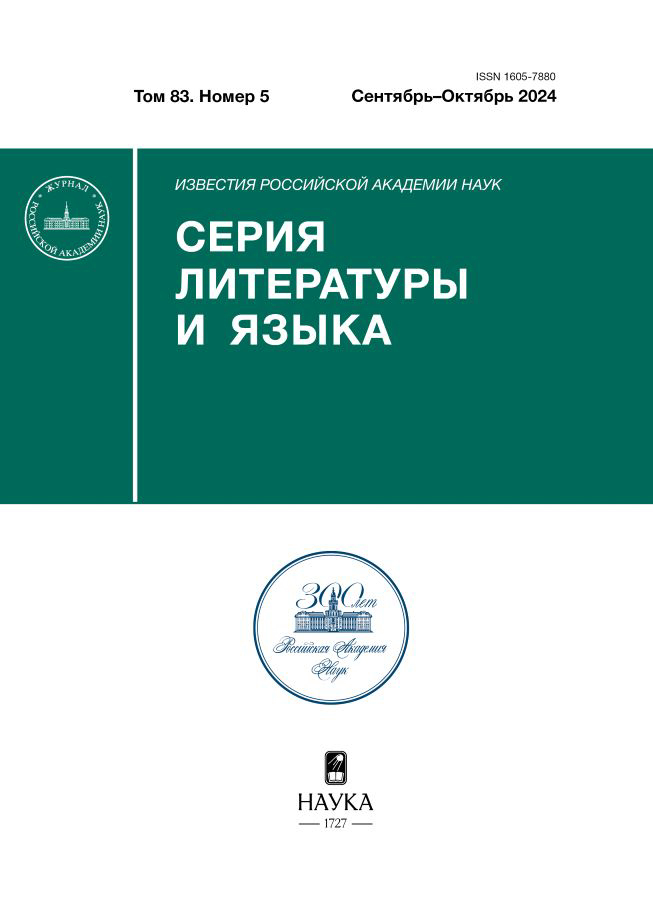How did the Chinese Russianists interpretate the leading theme in “The Tale of Igor’s Campaign”
- Authors: Li Z.1
-
Affiliations:
- Lomonosov Moscow State University
- Issue: Vol 83, No 5 (2024)
- Pages: 150-156
- Section: Articles
- URL: https://rjonco.com/1605-7880/article/view/657047
- DOI: https://doi.org/10.31857/S1605788024050138
- ID: 657047
Cite item
Abstract
The reception of “The Tale of Igor’s Campaign” in China can be traced back to a hundred years ago. The most significant issue in this process was the discussion about the leading theme in this epic, initiated by the Chinese Russianists. This article mainly focuses on an important controversy about the patriotic idea in the “The Tale of Igor’s Campaign” that arose in China in the 1980s. Firstly, the author overviews the main works and their basic views in this discussion, including the “initiator” of this debate, Liu Wenxiao, who denied the presence of patriotic ideas in this epic, and his opponents Wei Huangnu, Bao Liangjun and Lu Jiayu, who firmly support the patriotic character of it. In addition, the Chinese researchers’ cogitation on the main idea of this epic and the debates themselves in the 21st century are also presented as comparative material. Subsequently, this article attempts to examine the aesthetic subjectivity reflected in this process from the perspective of receptive theory. The historical conditions that influenced the specific interest of Chinese readers in the “The Tale of Igor’s Campaign” are considered, and thus the personal experience that contributed to the formation of Liu Wenxiao’s views is recognized.
Full Text
About the authors
Ziwei Li
Lomonosov Moscow State University
Author for correspondence.
Email: zwli1563107653@outlook.com
Postgraduate student of the Department of the History of Russian Literature, Faculty of Philology
Russian Federation, 1 Leninskie Gory, Moscow, 119991References
- Wei Huangnu. Postscript. The Tale of Igor’s Campaign. Beijing, 1957, pp. 52–66. (In Chinese)
- Liu Wenxiao. On the Definition of “Patriotism” in “The Tale of Igor’s Campaign”. Bulletin of Kunming Normal College. Series of Philosophical and Social Sciences. 1982, No. 3, pp. 54–59. (In Chinese)
- Bao Lingjun. “The Tale of Igor’s Campaign” – a Patriotic Work. Soviet History. 1984, No. 1, pp. 33–37. (In Chinese)
- Wei Huangnu. “The Tale of Igor’s Campaign” in Chinaе. Research of Foreign Literature. 1985, No. 4, pp. 14–21. (In Chinese)
- Wang Renfa. On the Theme of “The Tales of Igor’s Campaign”. Bulletin of the Ankan Normal Special Course. 1999, No. 2, pp. 22–26. (In Chinese)
- Khalizev, V.E. Teoriia literatury [Theory of Literature]. Moscow, 2004. 405 p. (In Russ.)
- Humboldt, W. von. Iazyk i filosofiia kultury [Language and Culture of Philosophy]. Moscow, 1985. 450 p. (In Russ.)
- Humboldt, W. von. O vliianii razlichnogo kharaktera iazykov na literaturu i dukhovnoe razvitie [On the Influence of the Different Nature of Languages on Literature and Spiritual Development]. Humboldt W. von. Izbrannye trudy po iazykoznaniiu [Selected Works on Linguistics]. Moscow, 1984, pp. 324–326. (In Russ.)
- Toporov, V.N. Prostranstvo kultury i vstrechi v nem [Space of Culture and Meetings in it]. Vostok–Zapad. Issledovaniia. Perevody. Publikatsii [East–West. Research. Translations. Publications]. Issue. 4. Moscow, 1989, pp. 6–17. (In Russ.)
- Opening words. Hongdou mankan. 1934, Vol. 2, No. 3. Special issue “Historical Epics of the World”. p. 2. (In Chinese)
- Rybakov, B.A. Kievskaia Rus i russkie kniazhestva XII–XIII vv. Proiskhozhdenie Rusi i stanovlenie ee gosudarstvennosti [Kievan Rus and Russian Principalities of the 12th–13th Centuries. The Origin of Rus and the Formation of its Statehood]. Moscow, 2013. 622 p. (In Russ.)
Supplementary files










